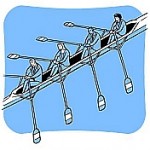Four rules of effective teamwork
 If during the implementation of your project the team gets stuck with lots of unproductive conflicts and unsolved problems, you can try to follow a general list of team management recommendations. If you haven’t yet found a solution, you can get your team together at a meeting to clarify and agree on the basic rules of teamwork that will govern the team’s behavior. By establishing such rules, you gain more chances to achieve greater team effectiveness and strengthen group collaboration. Read top 4 teamwork tips that you must take into account for building and managing your team.
If during the implementation of your project the team gets stuck with lots of unproductive conflicts and unsolved problems, you can try to follow a general list of team management recommendations. If you haven’t yet found a solution, you can get your team together at a meeting to clarify and agree on the basic rules of teamwork that will govern the team’s behavior. By establishing such rules, you gain more chances to achieve greater team effectiveness and strengthen group collaboration. Read top 4 teamwork tips that you must take into account for building and managing your team.
Tip #1: Schedule regular meetings
A team meeting is a great opportunity to meet the members of your team face-to-face and talk about existing problems. When you carry out a project, you need to take care of arranging regular team meetings at which you will discuss issues, resolve conflicts, find solutions, make offers, etc. Multidisciplinary team meetings should be planned in advance, and respective agendas should be added in your general project plan. You will need to develop schedules and make sure every member of the team is aware of the events and questions planned for discussion at the next collaborative meetings.
Tip #2: Strengthen collaboration
A team work makes the dream work, so the way how your team works will define the success of your project. Your team needs to collaboratively follow a strictly defined and planned workflow that shows sequences of tasks and processes to be carried out next day/week/month/quarter. You can use project management software (ex.: MS Project, VIP Task Manager) to define collaborative workflows, create job schedules, and prioritize group-based tasks and processes. Effective collrboation will be achieved if common roles and responsibilities in a team are identified and assigned, so when designing workflows, you need to take into account existing roles and responsibilities in your work team.
Tip #3: Establish good communication
Communication is a vital team building process that allows team members to communicate with each other and share ideas. Most team-related issues are caused by a lack of effective communication when people become aggressive and de-motivated and create conflict situations. Effective communication between team members is the key aspect of successful team collaboration and productive and non-conflict relationships. As a leader of your work team, you need to take care of developing communication skills, maintaining effective team communication activities, and implementing modern means of communication (incl. software). Usually special team communication training and exercises are used to teach group members to communicate with each other and share information. You can arrange regular training activities in your team.
.
Tip #4: Ensure decision making
A strategic leader of a work team can utilize decision-making as a powerful tool for increasing teamwork effectiveness. Work team decision-making is a cognitive process of selecting, analyzing and approving a course of actions among alternatives. Effective decision-making can be achieved by using a process of consensus. The consensus process allows knowing how to forge consensus for teamwork development, leading and implementation.
Defining the basic rules of teamwork will uncover hitherto unspoken assumptions and new ideas. You can modify and supplement the suggested rules with your own ideas. Remember that each team member needs to understand your rules of teamwork in order to see more clearly where other team members are coming from and what is required from the whole team to produce a result and get job done.














